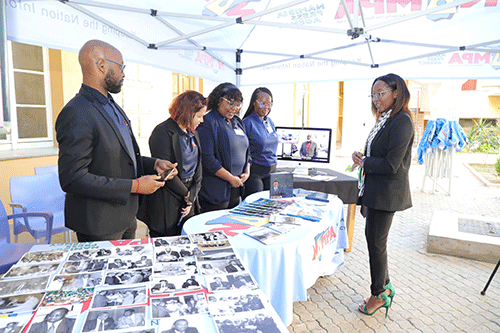The editorial independence of State-funded media entities has come under scrutiny in the National Assembly this week after lawmakers questioned whether the parastatals are entirely free, despite receiving substantial subsidies from the public purse.
Parliamentarians also questioned why institutions like the New Era Publication Corporation (NEPC), the Namibia Press Agency (Nampa) and the Namibian Broadcasting Corporation (NBC) do not generate income for themselves.
This comes after a budget motivation from the information ministry that allocates over N$27 million to New Era and Nampa each, and over N$300 million to NBC.
The amounts for Nampa and New Era are more than double what the entities received in 2022 and previous years.
During her budget presentation on Monday, information minister Emma Theofelus stated that the ministry “continues to advocate for a liberalised, conducive and self-regulating media culture”.
This statement left Landless People’s Movement (LPM) leader Bernadus Swartbooi perplexed, as he questioned the extent to which the media should be liberalised.
“Does she [Theofelus] mean the media fraternity should liberalise its business models?” he queried.
Swartbooi believes the State lacks clarity regarding the direction it wants these institutions to take in terms of business models.
“New Era has become a more appealing newspaper, but if its financial performance does not reflect quality journalism, should we judge the institution solely on its financial performance or also on the journalistic quality it produces?” he asked.
He also criticised the ministry for not addressing how NBC plans to deal with business issues to generate more revenue, despite its talk of creating a strategic business plan to address administrative bottlenecks.
“I cannot deny that New Era has indeed improved its publications and become more newsworthy. However, my concern is that New Era should not rely solely on government funding for its newsworthiness; instead, it should generate income through newspaper sales,” complained Popular Democratic Movement (PDM) parliamentarian Elma Dienda.
Dienda argued that the publication cannot depend on taxpayers’ money indefinitely.
“I have a problem with continuously increasing funding to these entities. What are they doing with the income they generate from selling newspapers? Please explain the 150% increase,” she questioned.
However, Dienda commended the ministry for doubling the budget of the Namibia Film Commission from N$3 million to N$6 million, saying the film entity has consistently proven its ability to achieve more with less.
Echoing Dienda’s concerns, fellow PDM MP, Jennifer Van den Heever, questioned whether the State’s funding of these entities might compromise their editorial independence.
“With all the financial resources allocated to New Era, do you believe it remains free and independent? How does New Era ensure impartiality in its reporting?” she asked.
Van den Heever suggested that the government should rather invest in digital media, which poses a threat to traditional media.
The parliamentarian revisited the conversation about merging New Era and Nampa to reduce costs.
In 2022, Cabinet approved a plan to merge Nampa and New Era to avoid duplicating government activities and spending.
However, the merger remains unresolved.
Patience Masua, a Swapo MP, suggested that the government institutionalise the office of the media ombudsman with staff.
“This office can address media complaints from both citizens and members of the press,” she proposed.
Why now?
In an interview with New Era, media expert Zoe Titus also questioned why subsidies of publicly-funded media entities were doubled, and why now?
Supporting the concerns of parliamentarians, Titus said that in an ideal scenario, State funding should not affect editorial independence.
“We know that in Namibia, that isn’t the case,” she noted.
She validated concerns about funding, stating that they are legitimate because the country is facing elections, where media plays a critical role.
“Why the increase in funding now? Is it because it is an election year? The editorial independence of all media entities should be protected at all costs, but we know from experience that there are interferences. This has been a long-standing question, and that is why civil society has been campaigning for many years regarding the regulation of NBC and other state media houses,” she emphasised.
Press is free
Amidst the concerns, information minister Theofelus said the press is independent and adheres to media ethics.
She also said there is a media ombudsman to address any grievances, and people also have recourse to the courts.
“To my knowledge, the media is independent, which is why we continue to hold the number one spot for press freedom on the continent, and typically rank in the top 20 globally,” she said.
Regarding budget issues, Theofelus explained that the aim is to increase operations, as the needs of the corporations change in an ever-evolving media landscape.
While media independence is assured, Theofelus also emphasised that media must compete with the best broadcasters or print media globally.
However, State media houses cannot neglect their parliamentary or legal duties outlined in relevant establishing acts.
These duties include bridging the gap in information dissemination, which she said is primarily the State media role in the sector.
“This is why they are designated as non-commercial entities under the Public Enterprises Governance Act of 2019,” she added.
Caption:


